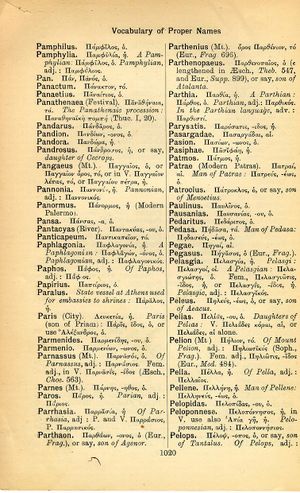Pelops
Κατηγορεῖν οὐκ ἔστι καὶ κρίνειν ὁμοῦ → Iudex et accusator esse idem nequit → Wer anklagt, darf nicht auch noch Richter sein zugleich
English > Greek (Woodhouse)
Πέλοψ, -οπος, ὁ, or say, son of Tantalus.
Of Pelops, adj.: Πελόπιος.
Descendant of Pelops: Πελοπίδης, -ου, ὁ.
Latin > English (Lewis & Short)
Pĕlops: ŏpis, m., = Πέλοψ.
I Son of Tantalus, king of Phrygia, father of Atreus and Thyestes, grandfather of Agamemnon and Menelaus; in his childhood he was served up to the gods by his father for food (truncatus Pelops, Stat. Th. 4, 590), but was recalled to life by Jupiter, who gave him an ivory shoulder in place of the one eaten by Ceres (umeroque Pelops insignis eburno, Verg. G. 3, 7). Being afterwards driven out of Phrygia, he went to Elis, and by artifice obtained the hand of Hippodamia, daughter of king Œnomaus, to whose throne he succeeded. By means of the wealth which he brought with him, he acquired so great an influence that the entire peninsula was called, after him, the island of Pelops (Peloponnesus), Hyg. Fab. 83, 84; Serv. Verg. G. 3, 7; Cic. N. D. 3, 21, 53; id. Tusc. 1, 44, 107; 2, 27, 67: Pelope natus, i. e. Thyestes, Enn. ap. Cic. Tusc. 3, 12, 26 (Trag. v. 397 Vahl.): ex Tantalo Pelops, ex Pelope autem satus Atreus, Trag. Rel. Inc. Fab. v. 102 Rib.: Pelopis genitor, i. e. Tantalus, Hor. C. 1, 28, 7.
1 Pĕlŏpēïas, ădis, f. adj., Pelopian, Peloponnesian: Pelopeïadesque Mycenae, Ov. M. 6, 414.—
2 Pĕlŏpēïs, ĭdis, f. adj., Pelopian, Peloponnesian: Pelopeides undae, the sea that surrounds the Peloponnesus, Ov. F. 4, 285.—Hence, Pĕlŏpēĭdes, um, f., the Argive women, Stat. Th. 10, 50; 12, 540.—
3 Pĕlŏpēïus, a, um, adj., = Πελοπήιος.
a Pelopian: Pelopeius Atreus, Ov. H. 8, 27: virgo, i. e. Iphigenia, daughter of Agamemnon, id. Tr. 4, 4, 67: arva, i. e. Phrygia, the native country of Pelops, id. M. 8, 622.—Subst.: Pĕlŏpēia, ae, f., a female descendant of Pelops, Ov. H. 8, 81.—
b Peloponnesian: Pelopeia sedes, i. e. the seat of Creon, king of Corinth, Sen. Med. 891: oppida, Claud. in Rufin. 2, 188: regna, the Peloponnesus, Stat. Th. 1, 117. —
4 Pĕlŏpēus, a, um, adj.
a Pelopian: Agamemnon, Prop. 4 (5), 6, 33: domus, the race of the Pelopides, id. 3, 17, 20 (4, 18, 20): P. Orestes, Luc. 7, 778.—Subst.: Pĕ-lŏpēa, ae, f., the daughter of Pelops, Ov. Ib. 361; Claud. in Eutr. 1, 291; the name of a tragedy, Juv. 7, 92.—
b Peloponnesian: Pelopea phalanx, the Argive army, Stat. Th. 7, 422.—Poet., in a more extended sense, for Grecian: Pelopea ad moenia, i. e. to Greece, Verg. A. 2, 193.—
5 Pĕlŏ-pĭdae, ārum, m., the descendants of Pelops (notorious for their crimes), the Pelopides, Hyg. Fab. 86; an old poet in Cic. Fam. 7, 28, 2; 7, 30, 1; id. Att. 14, 12, 2; 15, 11, 3 (applied by Cicero to the adherents of Cæsar).—
6 Pĕlŏpĭus, a, um, adj., Pelopian: Pelopia domus, Sen. Agam. 7.—
II A slave's name, Cic. Att. 14, 8, 1.
Latin > French (Gaffiot 2016)
Pĕlops,¹¹ ŏpis, m. (Πέλοψ),
1 fils de Tantale [dont les membres furent servis par son père dans un festin qu’il offrait aux dieux ; Jupiter lui rendit la vie] : Cic. Nat. 3, 53 ; Virg. G. 3, 7
2 nom d’un roi de Lacédémone : Liv. 34, 32 || nom d’un Byzantin : Cic. Att. 14, 8, 1.
Latin > German (Georges)
Pelops, opis, m. (Πέλοψ), Sohn des Tantalus, Gemahl der Hippodamia, Schwiegersohn des Önomaus, Vater des Atreus, Thyestes u.a., der Liebling des Poseidon (Neptun); nach Pelops soll der Peloponnes benannt sein. Tantalus bewirtete einst die Götter, deren Liebling er war, schlachtete bei dieser Gelegenheit seinen Sohn Pelops, zerstückelte ihn (dah. truncatus Pelops, griech. πρισθείς, Stat. Theb. 4, 590) und setzte ihn seinen Gästen vor. Die Unsterblichen ließen sich durch das gräßliche Gericht nicht täuschen und berührten es nicht. Nur Demeter (Ceres), vertieft in den Schmerz um ihre verlorene Tochter, verzehrte die Schulter. Darauf ließen die Götter durch Hermes (Merkur) die zerstückelten Glieder des Knaben in einen Kessel tun u. ihm durch Kochen Gestalt und Leben wiedergeben. Klotho zog ihn aus dem Kessel heraus, und da die verzehrte Schulter fehlte, ersetzte Demeter (Ceres) diese durch eine elfenbeinerne (dah. umero Pelops insignis eburno, Verg. georg. 3, 7), Hyg. fab. 83 sq. Cic. de nat. deor. 3, 53; Tusc. 2, 67: Pelope natus, Thyestes, Enn. fr. scen. 357: ex Tantalo Pelops, ex Pelope autem satus Atreus, Trag. inc. fab. 102: Pelopis genitor, Tantalus, Hor. carm. 1, 28, 7: Pelopis sedes, der Peloponnes, Sil. 15, 306. – Dav.: A) Pelopēias, adis, f. (Πελοπηϊάς), pelopëisch, pelo ponnesisch, Mycenae, Ov. – B) Pelopēius, a, um (Πελοπήϊος), zu Pelops gehörig, pelopëisch, a) eig.: Atreus, Sohn des Pelops, Ov.: virgo, Iphigenia, Tochter des Agamemnon, eines Enkels des Pelops, Ov.: Pelopeia credar, für eine aus der Familie des Pelops, Ov.: arva, phrygisch, weil Pelops da geboren ist, Ov. – b) poet. übtr., peloponnesisch, oppida, Stat.: regna, der Peloponnes, Stat.: sedes, Sitz des korinthischen Herrschers Kreon, Sen. poët. – C) Pelopēus, a, um (Πελόπειος), pelopëisch, Agamemnon, des Pelops Enkel, Prop.: Orestes, des Pelops Urenkel, Lucan.: domus, des Pelops Familie, Prop.: moenia, Stadt Argos, Verg.: regna, der Peloponnes, Sil. – subst., Pelopēa, ae, f., die Enkelin des Pelops, Tochter des Thyestes, Ov. u. Claud. – D) Pelopidae, ārum, m. (Πελοπίδαι), die Pelopiden = die Nachkommen u. Verwandten des Pelops, wegen Gottlosigkeit u. Grausamkeit berüchtigt, Acc. tr., Cic. u.a. (Genet. Plur. Pelopidum, Acc. tr. 42). – E) Pelopius, a, um (Πελόπιος), pelopisch, Sen. poët. – subst., Pelopia, ae, f., die Enkelin des Pelops, Tochter des Thyestes, Serv. u. Hygin. – F) Peloponnēsus, s. bes.

